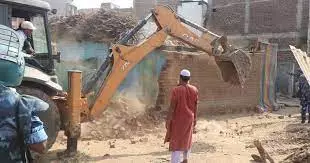
Socially engineered hate of pushing Muslims into ghettos
text_fieldsIncidents of members of the Muslim community being displaced from their homes, often in a systematic manner, are exemplified in many cases. For instance, in a recent protest in Vadodara, Gujarat, about 30 residents objected to a Muslim woman moving into a government-allotted flat, indicating a deep-seated prejudice towards the community.
This incident, rooted in claims that the presence of the Muslim family posed a "threat and nuisance," reflects a broader, systematic pattern of discrimination and forced displacement that has intensified over the past decade.
Under the BJP rule, instances of anti-Muslim bigotry have been on the rise across the country. In June last year, Muslim traders in Purola, Uttarakhand, experienced vandalism and threats, compelling numerous families to flee.
Similarly, Dharchula town witnessed a comparable situation in March. Post-violence in Haryana’s Nuh in August, the local Muslim community faced targeted government actions under the guise of "bulldozer justice."
These displacements are not new phenomena but have historical roots, notably since the nationwide riots following the demolition of the Babri Masjid in 1992, according to an article written by journalist Dipti Nagpaul in scroll.in.
Nagpaul attributed the trend to riots and disturbances that have often led to Muslims being forced to relocate from mixed-demographic neighbourhoods to segregated ghettos. This trend has been particularly visible in Mumbai and Gujarat.
After the 1992-1993 Mumbai riots, many Muslims moved to areas like Mira Road and Mumbra. Following the 2002 Gujarat riots, regions like Citizen Nagar and Juhapura in Ahmedabad saw significant increases in their Muslim populations.
These movements, although appearing voluntary, are in fact coerced responses to the state's failure to protect its citizens. The government’s inability to ensure safety has forced many Muslims to seek security through self-imposed segregation. The resulting neighbourhoods, often derogatorily referred to as "Chhota Pakistan" by Hindu residents, symbolize the deep-seated societal divisions and the state’s implicit endorsement of such biases.
Viewing these incidents as isolated events of sectarian tension overlooks the broader human rights crisis. The repeated displacement of Muslims should be recognized as a severe issue of forced migration and coercive disruption to their lives. This form of displacement begins long before physical relocation, marked by ongoing pressures and constraints that push communities into segregated areas.
The impact on displaced communities is profound and multifaceted. Forced to abandon their homes, these individuals often relocate to city outskirts lacking essential infrastructure. These areas suffer from inadequate housing, poor sanitation, and limited access to clean water, education, and healthcare. Economically, many displaced people lose their jobs and face significant challenges in securing new employment, exacerbating their financial distress.
Mumbra, on the outskirts of Mumbai, exemplifies these challenges. Initially a small Konkani Muslim community, Mumbra’s population surged post-1992-1993 riots, growing from 40,000 to over nine lakh by the last census. Despite decades of development efforts, basic infrastructure like water supply, hospitals, and schools remain inadequate, and the area is often stigmatized as a crime hotspot.
The pervasive sense of betrayal and loss of trust in neighbours and state machinery, coupled with the fear of violence, defines the daily lives of many displaced Muslims.
The situation of the government employee in Vadodara is a stark reminder of the need to address these issues as a crisis of displacement and forced migration rather than mere religious discrimination. Judicial redress and active state intervention are crucial in protecting these vulnerable populations from an indifferent and, at times, complicit state apparatus.























